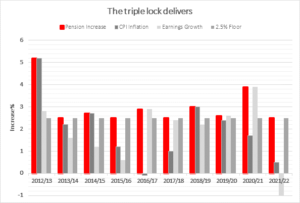
The main state pensions will rise by 2.5% in April.

The absence of an autumn Budget in 2020 meant that there was no formal announcement of the level of state pensions from April 2021. The numbers eventually emerged on 8 December in a press release from the Department for Work and Pensions:
- The new state pension, which applies if you reach(ed) state pension age (SPA) after 5 April 2016 rises to £179.60 a week, an increase of 2.5%. If you are nearing your SPA (now 66, do not forget) you are most unlikely to receive that figure as your state pension will be subject to transitional rules introduced in 2016, when the old state pension was replaced by the current variant.
- The old state pension, which applies if you reached SPA before 6 April 2016, also rises by 2.5% to £137.60 a week.
- Payments under other state pensions, such as the state second pension (S2P), will increase by 0.5%.
The minimal increases outside the two main state pensions are because only the new and old state pensions benefit from the ‘triple lock’, which raises payment each year by the greater of CPI inflation (0.5% on this occasion), earnings growth (a 1% fall) and 2.5%. Where the triple lock does not apply, CPI inflation is used. As the graph shows, the triple lock has delivered above-inflation increases in seven of the last ten years. Over that period the gap between a CPI-linked pension and a triple-locked pension has grown to nearly 11%.
Both the cost and intergenerational fairness of providing the triple lock have regularly been called into question. Although the Conservatives’ 2019 manifesto promised to protect the lock, the pandemic expenditure and this year’s inflation-busting increase have once again brought a spotlight on the triple lock’s affordability.
Whether or not the triple lock survives, UK state pensions remain among the least generous in the developed world. The latest survey from the OECD showed the UK at the bottom of the organisation’s league table for replacement income, providing less than half the OECD average.
Thus, while the state pension has been outpacing inflation, it is still far from being sufficient to fund a comfortable retirement. For that, additional private pension provision is necessary.
If you are interested in discussing the above with one of our experienced financial planners at FAS, please get in touch here.
The value of your investment and the income from it can go down as well as up and you may not get back the full amount you invested. Past performance is not a reliable indicator of future performance.





